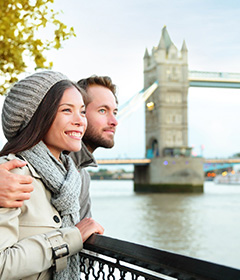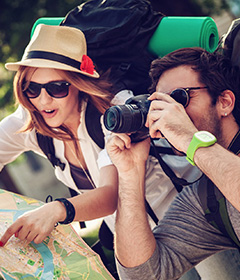Embarking on a journey together can be an exhilarating experience for couples, offering unique opportunities to grow closer and deepen their connection. However, the challenges of travel can also put strain on even the strongest relationships. By approaching your adventures with intention and employing effective strategies, you can transform your travels into a powerful tool for strengthening your bond. This comprehensive guide explores key aspects of couple travel, from pre-trip preparation to post-journey reflection, providing you with the tools to navigate the ups and downs of exploring the world together.
Pre-trip relationship assessment and goal setting
Before setting off on your adventure, take time to assess your relationship’s current state and establish clear goals for your journey together. This process helps create a shared vision and sets the foundation for a positive travel experience. Begin by having an open conversation about your expectations, fears, and aspirations for the trip. Consider discussing the following areas:
- Personal growth objectives
- Relationship enhancement goals
- Cultural experiences you both want to have
- Challenges you anticipate and how you’ll address them
By aligning your expectations and setting mutual goals, you create a roadmap for your journey that encompasses both individual and shared aspirations. This alignment can significantly reduce potential conflicts and enhance your overall travel experience.
Additionally, consider creating a relationship travel contract that outlines your agreed-upon goals, boundaries, and strategies for handling disagreements. This document serves as a tangible reminder of your commitment to each other and your shared adventure.
Communication strategies for harmonious travel
Effective communication is the cornerstone of any strong relationship, and its importance is magnified when traveling together. The stress of navigating unfamiliar environments and cultures can strain even the most solid partnerships. Implementing robust communication strategies can help you maintain harmony and deepen your connection while on the road.
Active listening techniques in High-Stress situations
Active listening becomes crucial when facing travel-related challenges. Practice these techniques to ensure you’re truly hearing and understanding your partner:
- Maintain eye contact and give your full attention
- Paraphrase what you’ve heard to confirm understanding
- Ask open-ended questions to encourage deeper discussion
- Avoid interrupting or formulating responses while your partner is speaking
By employing these active listening skills, you create a safe space for open dialogue, even in stressful situations. This approach fosters mutual respect and understanding, crucial elements for navigating the complexities of travel together.
Conflict resolution models for travel disputes
Disagreements are inevitable when traveling as a couple. Having a pre-established conflict resolution model can help you address issues constructively. Consider adopting the DEAR MAN technique:
- D escribe the situation objectively
- E xpress your feelings and thoughts
- A ssert your needs clearly
- R einforce the positive outcomes of resolution
- M indful of the other person’s perspective
- A ppear confident in your communication
- N egotiate to find a mutually beneficial solution
This structured approach to conflict resolution can help you navigate disagreements more effectively, ensuring that both partners feel heard and respected throughout the process.
Non-verbal cues and cultural sensitivity abroad
When traveling internationally, it’s essential to be aware of cultural differences in non-verbal communication. What might be a harmless gesture in your home country could be offensive elsewhere. Research the cultural norms of your destinations together and discuss how you’ll navigate these differences as a couple.
Pay attention to your partner’s non-verbal cues, which can be particularly telling in unfamiliar or stressful situations. A gentle touch or reassuring smile can communicate support and understanding without words, strengthening your bond even in challenging moments.
Daily debriefing rituals for emotional Check-Ins
Establish a daily ritual for emotional check-ins with your partner. This could be over morning coffee, during an evening stroll, or before bed. Use this time to reflect on the day’s experiences, share highlights and challenges, and discuss any concerns or needs. Regular check-ins help prevent small issues from escalating and ensure that both partners feel emotionally supported throughout the journey.
Collaborative itinerary planning and decision making
Planning your travel itinerary together is an opportunity to practice collaboration and compromise, skills that will serve you well throughout your journey. Approach the planning process as a team, ensuring that both partners’ interests and preferences are represented in the final itinerary.
Balancing individual preferences with shared experiences
Acknowledge that you and your partner may have different travel styles or interests. The key is to find a balance that satisfies both individuals while creating shared experiences. Consider alternating days where one partner takes the lead in choosing activities, or divide each day into segments where you each get to pursue your interests.
Create a bucket list for your trip that includes both individual and shared goals. This approach ensures that you both have experiences to look forward to and helps in creating a well-rounded itinerary that caters to both partners’ desires.
Negotiation tactics for activity selection
When selecting activities, employ negotiation tactics that focus on mutual gain rather than individual wins. Use the following strategies:
- Identify underlying interests behind activity preferences
- Brainstorm creative solutions that satisfy both partners’ needs
- Use a point system to fairly allocate activity choices
- Consider bundling less desirable activities with more appealing ones
Remember, the goal is to create a travel experience that enriches your relationship, not to “win” every decision. Flexibility and willingness to try new things can lead to unexpected joys and shared discoveries.
Compromise strategies for budget allocation
Financial discussions can be a source of tension for many couples. When allocating your travel budget, use these compromise strategies:
- Set a daily spending limit that you both agree on
- Create categories for expenses and allocate funds accordingly
- Agree on splurge moments and areas where you’ll economize
- Use a shared budgeting app to track expenses transparently
By approaching budget decisions collaboratively, you can avoid financial conflicts and ensure that your spending aligns with your shared travel goals and values.
Cultivating intimacy through shared adventures
Travel offers unique opportunities to cultivate intimacy and strengthen your emotional connection. Shared adventures create lasting memories and deepen your bond in ways that everyday life often can’t match. Here are some strategies to enhance intimacy during your travels:
Create rituals that are specific to your journey. This could be a special toast at the start of each new destination or a nightly stargazing session. These rituals become touchstones of your shared experience, reinforcing your connection.
Embrace spontaneity together. Allow room in your itinerary for unplanned adventures. These spontaneous moments often become the most cherished memories and can spark a sense of excitement and novelty in your relationship.
Document your journey creatively. Start a travel journal together, create a shared photo album, or collaborate on a blog. This process of recording and reflecting on your experiences can bring you closer and provide a lasting memento of your adventure.
Challenge yourselves as a team. Try new activities that push both of you out of your comfort zones. Overcoming challenges together can be a powerful bonding experience and build trust and mutual support.
“Travel is like love, mostly because it’s a heightened state of awareness, in which we are mindful, receptive, undimmed by familiarity and ready to be transformed. That is why the best trips, like the best love affairs, never really end.”
This quote captures the essence of how travel can transform your relationship, keeping it fresh and vibrant through shared experiences and mutual growth.
Managing stress and maintaining personal space while traveling
While traveling as a couple can be incredibly rewarding, it also presents unique challenges, particularly when it comes to managing stress and maintaining personal space. Constant togetherness, unfamiliar environments, and the pressures of travel can strain even the strongest relationships. Implementing strategies to manage these challenges is crucial for a harmonious journey.
Recognizing and respecting Introversion/Extroversion needs
Understanding and respecting each other’s personality types is essential for maintaining balance during your travels. Introverts may need more alone time to recharge, while extroverts might crave social interactions. Discuss these needs openly and plan your activities accordingly. For example:
- Allow for solo exploration time in new cities
- Balance group tours with independent activities
- Create quiet spaces in shared accommodations for reflection
- Seek out social events that cater to both partners’ comfort levels
By acknowledging and accommodating these differences, you can ensure that both partners feel energized and fulfilled throughout the journey.
Implementing ‘Time-Out’ protocols during extended trips
Extended travel can be particularly challenging for couples. Implement a ‘time-out’ protocol that allows either partner to request a break when feeling overwhelmed. This could involve:
- A pre-agreed signal or phrase to indicate the need for space
- Designated solo activities or days built into your itinerary
- A no-questions-asked policy for short periods of solitude
- Agreed-upon reconnection points after time apart
These protocols provide a safety valve for tension and allow both partners to maintain their individual identities within the context of the shared journey.
Stress-reduction techniques for Travel-Related anxiety
Travel can trigger anxiety in many individuals, which can negatively impact the relationship dynamic. Practice these stress-reduction techniques together:
- Mindfulness meditation to center yourselves in stressful moments
- Deep breathing exercises to calm nerves before flights or in crowded spaces
- Progressive muscle relaxation to release physical tension
- Journaling to process emotions and experiences
By engaging in these practices together, you not only reduce individual stress levels but also create a shared language for managing anxiety as a team.
Creating Micro-Moments of privacy in shared accommodations
In the close quarters of shared travel accommodations, finding privacy can be challenging. Get creative in carving out personal space:
- Use headphones to create auditory privacy
- Designate specific areas or times for individual use
- Take turns exploring nearby cafes or parks solo
- Create visual barriers with sarongs or travel sheets in hostels
These micro-moments of privacy can help maintain individual boundaries and prevent feelings of claustrophobia in your shared travel experience.
Post-trip reflection and relationship growth evaluation
The journey doesn’t end when you return home. Post-trip reflection is crucial for integrating your travel experiences into your relationship and evaluating your growth as a couple. Set aside time to discuss your adventure, focusing on both the highlights and the challenges you overcame together.
Review the goals you set before the trip and assess how well you met them. Discuss what you learned about each other and how these insights can be applied to strengthen your relationship moving forward. Consider creating a relationship growth map that outlines:
- Key moments of connection during your travels
- Challenges you overcame and lessons learned
- New shared interests or passions discovered
- Areas for continued growth and future travel aspirations
This reflection process helps solidify the positive impacts of your journey and provides direction for your continued growth as a couple. It also sets the stage for planning future adventures, armed with new insights and strengthened bonds.
“The couple that travels together, grows together. Each journey is an opportunity to deepen understanding, create shared memories, and build a stronger foundation for your relationship.”
By approaching travel as a collaborative adventure in relationship building, you transform your journeys into powerful catalysts for personal and relational growth. The skills and experiences gained through traveling together can enhance your connection long after you’ve returned home, enriching your daily life with the spirit of exploration and mutual support that defines the best of travel partnerships.


